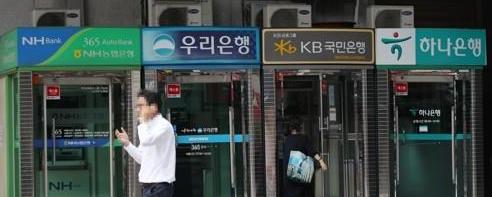Banks’ lending rates inch up amid tighter household debt control
By Choi Jae-heePublished : Sept. 5, 2021 - 14:21

Amid growing pressure from the government’s tightened grip on soaring household debt, South Korean banks’ lending rates sharply edged up in recent months, data showed Sunday.
The adjustable rate charged on mortgage loans extended by the nation’s four major banks -- KB Kookmin Bank, Shinhan, Hana and Woori -- remained between 2.80 percent and 4.30 percent, as of Friday. Both the bottom and upper ends of the range rose 0.5 percentage point from 2.35 to 3.88 percent estimated in June, industry data showed.
The rate for unsecured loans was between 3.00 and 4.05 percent, up 0.43 percentage point from the 2.564-3.62 percent rage at the end of May.
The banks appeared to either have raised the “additional interest rate,” which is placed on borrowers depending on their credibility or reduced the “special discount interest rates,” applied to those with ability to repay on time, industry sources said.
The move came as the financial authorities have strengthened supervision of snowballing household debts spurred by ample liquidity and a bubble in asset markets.
“The Financial Services Commission will make household debt management a top priority and mobilize all available policy means. We will continue to push ahead with measures to rein in soaring household debt that have already been announced without delay and prepare more policies, if needed,” said Koh Seung-beom, the new chairman of the policymaking FSC.
The proportion of Korea’s household debt to its GDP came to 98.6 percent at the end of June last year. The level of household debt in Asia’s fourth-largest economy outstripped the global average of 63.7 percent and the average in advanced countries of 75.3 percent, data showed.
Meanwhile, as the authority has been on a high alert over household debt issue, commercial banks are expected to squeeze the extension of “jeonse” loans, placing heavier burdens on ordinary home-seekers.
Jeonse is a type of housing lease where a homeowner leases out a living space for a lump-sum deposit and returns the money when the renter moves out.
Shinhan Bank recently decided to raise its lending rates on jeonse loans by 0.2 percentage point, which currently hovers between 2.77 and 3.87 percent. The measure will drive up the rate to a maximum of 4 percent, a bank official said.
The adjustable rate charged on mortgage loans extended by the nation’s four major banks -- KB Kookmin Bank, Shinhan, Hana and Woori -- remained between 2.80 percent and 4.30 percent, as of Friday. Both the bottom and upper ends of the range rose 0.5 percentage point from 2.35 to 3.88 percent estimated in June, industry data showed.
The rate for unsecured loans was between 3.00 and 4.05 percent, up 0.43 percentage point from the 2.564-3.62 percent rage at the end of May.
The banks appeared to either have raised the “additional interest rate,” which is placed on borrowers depending on their credibility or reduced the “special discount interest rates,” applied to those with ability to repay on time, industry sources said.
The move came as the financial authorities have strengthened supervision of snowballing household debts spurred by ample liquidity and a bubble in asset markets.
“The Financial Services Commission will make household debt management a top priority and mobilize all available policy means. We will continue to push ahead with measures to rein in soaring household debt that have already been announced without delay and prepare more policies, if needed,” said Koh Seung-beom, the new chairman of the policymaking FSC.
The proportion of Korea’s household debt to its GDP came to 98.6 percent at the end of June last year. The level of household debt in Asia’s fourth-largest economy outstripped the global average of 63.7 percent and the average in advanced countries of 75.3 percent, data showed.
Meanwhile, as the authority has been on a high alert over household debt issue, commercial banks are expected to squeeze the extension of “jeonse” loans, placing heavier burdens on ordinary home-seekers.
Jeonse is a type of housing lease where a homeowner leases out a living space for a lump-sum deposit and returns the money when the renter moves out.
Shinhan Bank recently decided to raise its lending rates on jeonse loans by 0.2 percentage point, which currently hovers between 2.77 and 3.87 percent. The measure will drive up the rate to a maximum of 4 percent, a bank official said.











![[Today’s K-pop] BTS pop-up event to come to Seoul](http://res.heraldm.com/phpwas/restmb_idxmake.php?idx=644&simg=/content/image/2024/04/17/20240417050734_0.jpg&u=)





![[KH Explains] Hyundai's full hybrid edge to pay off amid slow transition to pure EVs](http://res.heraldm.com/phpwas/restmb_idxmake.php?idx=652&simg=/content/image/2024/04/18/20240418050645_0.jpg&u=20240419100350)

![[Today’s K-pop] Zico drops snippet of collaboration with Jennie](http://res.heraldm.com/phpwas/restmb_idxmake.php?idx=642&simg=/content/image/2024/04/18/20240418050702_0.jpg&u=)